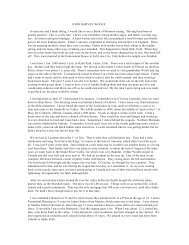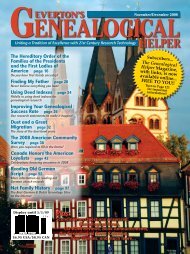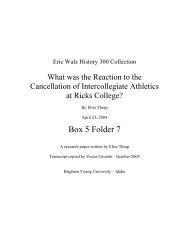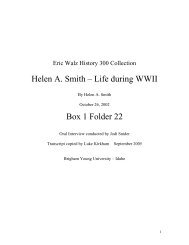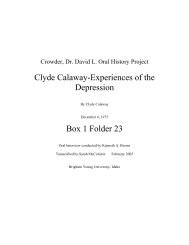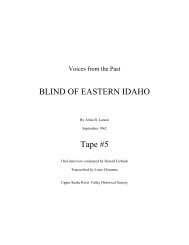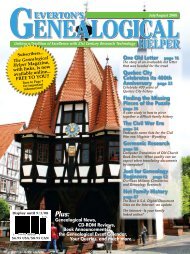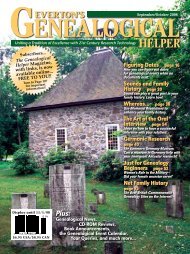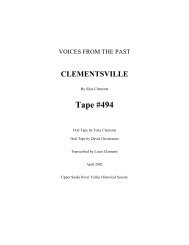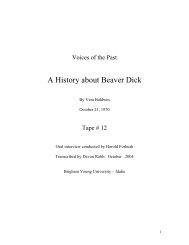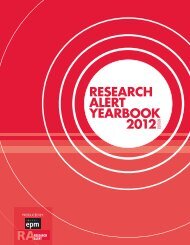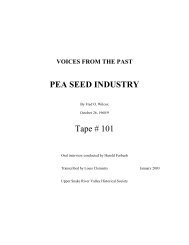HelPeR - BYU Idaho Special Collections and Family History
HelPeR - BYU Idaho Special Collections and Family History
HelPeR - BYU Idaho Special Collections and Family History
You also want an ePaper? Increase the reach of your titles
YUMPU automatically turns print PDFs into web optimized ePapers that Google loves.
Controlling<br />
Bias in Genealogy Research<br />
By Ro b e r t D. He n n o n<br />
Are you becoming frustrated with your genealogical research because you are not finding what you think<br />
you should Feel like giving up If you answer “yes,” you are probably not alone.<br />
AVolunteering as an attendant at my local <strong>Family</strong><br />
<strong>History</strong> Center for the past seven years, I became<br />
interested in the kinds of remarks beginners to genealogical<br />
research made when responding to help.<br />
These statements range from strictly personal ones to<br />
those gleaned from family members, teachers, books,<br />
magazines, <strong>and</strong> various <strong>and</strong> sundry sources telling<br />
them how to do genealogical research. Some of the<br />
typical remarks are: “Why can’t I find my gggr<strong>and</strong>father<br />
His name has always been spelled that way,”<br />
“I’m only interested in the census<br />
to find where my great gr<strong>and</strong>father<br />
lived,” “Deeds only show<br />
where people live,” “I found it on<br />
the Internet <strong>and</strong> it is not true,“ “I<br />
found it on the Internet <strong>and</strong> it is<br />
my family. I don’t need anything<br />
else.” “I can’t read this stuff because<br />
it’s foreign,” “I don’t really<br />
need a birth certificate because I<br />
know when they were born,” <strong>and</strong><br />
on <strong>and</strong> on. Some persons persevere<br />
<strong>and</strong> eventually succeed, but<br />
many never return to the <strong>Family</strong><br />
<strong>History</strong> Center. Why The answer can be found hidden<br />
in the statements made.<br />
Somewhere along the way to encouraging family<br />
research, the beginner has been told to look for<br />
certain information in this or that document, in this<br />
or that way, <strong>and</strong> when their ancestor was not found<br />
or they did not find the information they think they<br />
should have, they tend to give up. What they have<br />
been told began a process of setting biases that, unfortunately,<br />
often leads to negative results, hence,<br />
a turn-off to further work in genealogy. Making<br />
the beginning researcher aware of these negative<br />
biases <strong>and</strong> the influence on genealogical research,<br />
Once you begin<br />
to change the way<br />
in which you view<br />
your world, your<br />
biases will begin<br />
to drop away <strong>and</strong><br />
your research<br />
skills will improve.<br />
<strong>and</strong> some ways to minimize its effects will be the<br />
thrust of this article.<br />
The Oxford English Dictionary, 2nd ed. defines the<br />
word “bias” in a number of ways, but the two listings<br />
that pertain to genealogy research are: 1) “an inclination,<br />
or propensity; predisposition towards; predilection;<br />
prejudice,” <strong>and</strong> 2) “a swaying influence, impulse,<br />
or weight, ‘any thing which turns a man to a particular<br />
course, or gives the direction to his measures.’”<br />
Now, I am not a psychologist or sociologist, but it<br />
seems to me biases are acquired in<br />
two major stages during our maturation<br />
process, the pre-adult <strong>and</strong><br />
the adult stage. At what point we<br />
leave the pre-adult <strong>and</strong> enter the<br />
adult stage varies from person to<br />
person. Generally, the transition<br />
can be identified at the point when<br />
we assume responsibility for our<br />
own welfare. Even though most<br />
of us assume this responsibility,<br />
the biases imprinted upon us in<br />
the pre-adult stage become major<br />
factors determining the directions<br />
our lives will take in the adult stage.<br />
The pre-adult stage can be divided in at least two<br />
sub-stages: the pre-school period <strong>and</strong> the post-school<br />
period. Regardless of when the post-school period<br />
begins, it is in the pre-school period that our principal<br />
caregivers have the most impact on our perceptions<br />
<strong>and</strong> expectations of the world. Our caregivers<br />
teach us the rules <strong>and</strong> regulations on how to survive<br />
in the world <strong>and</strong> these rules <strong>and</strong> regulations become<br />
biases we cling to throughout our lives. As we begin<br />
to break away from the immediate control of the<br />
caregiver <strong>and</strong> enter some kind of formal educational<br />
system we acquire additional rules <strong>and</strong> regulations<br />
30 © Ev e r t o n’s Ge n e a l o g i c a l He l p e r Ja n ua ry/Fe b r u a r y 2009



